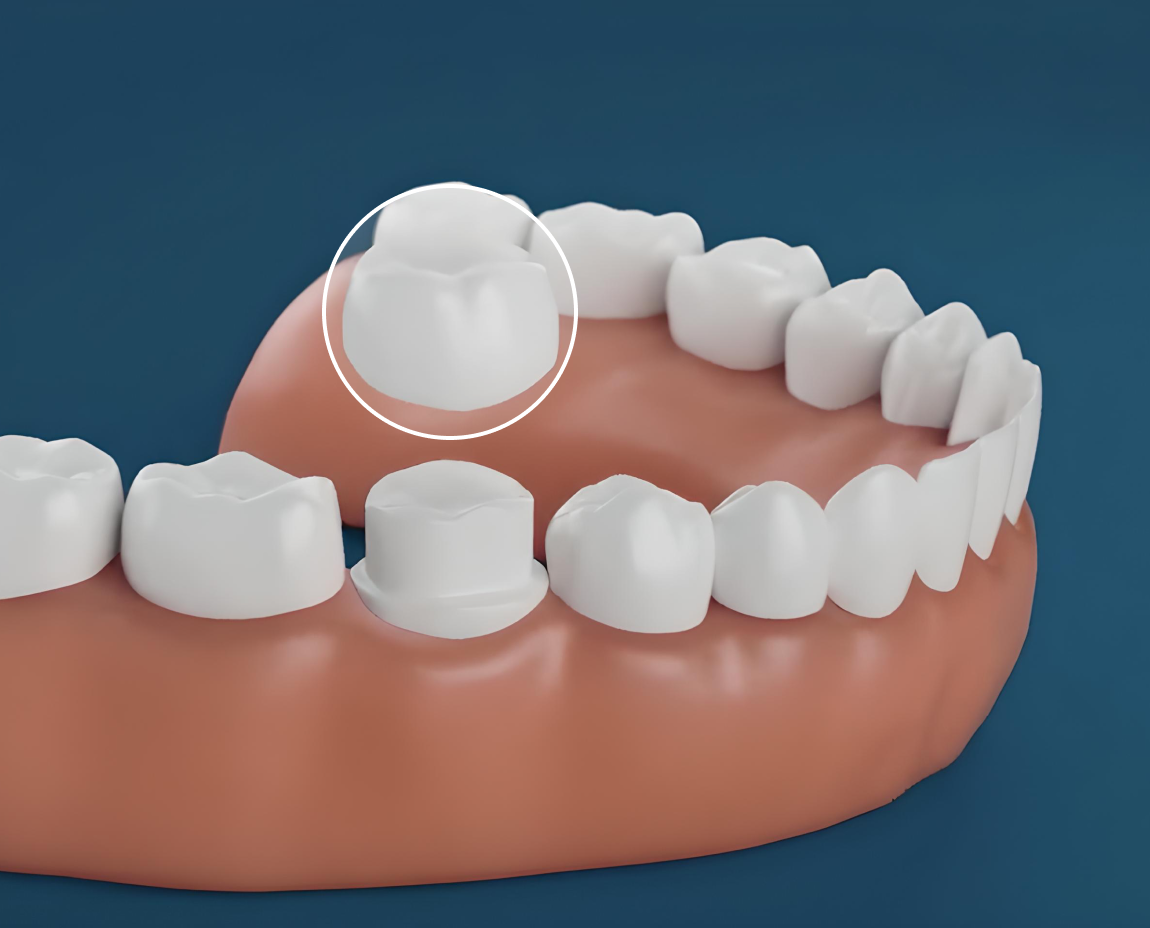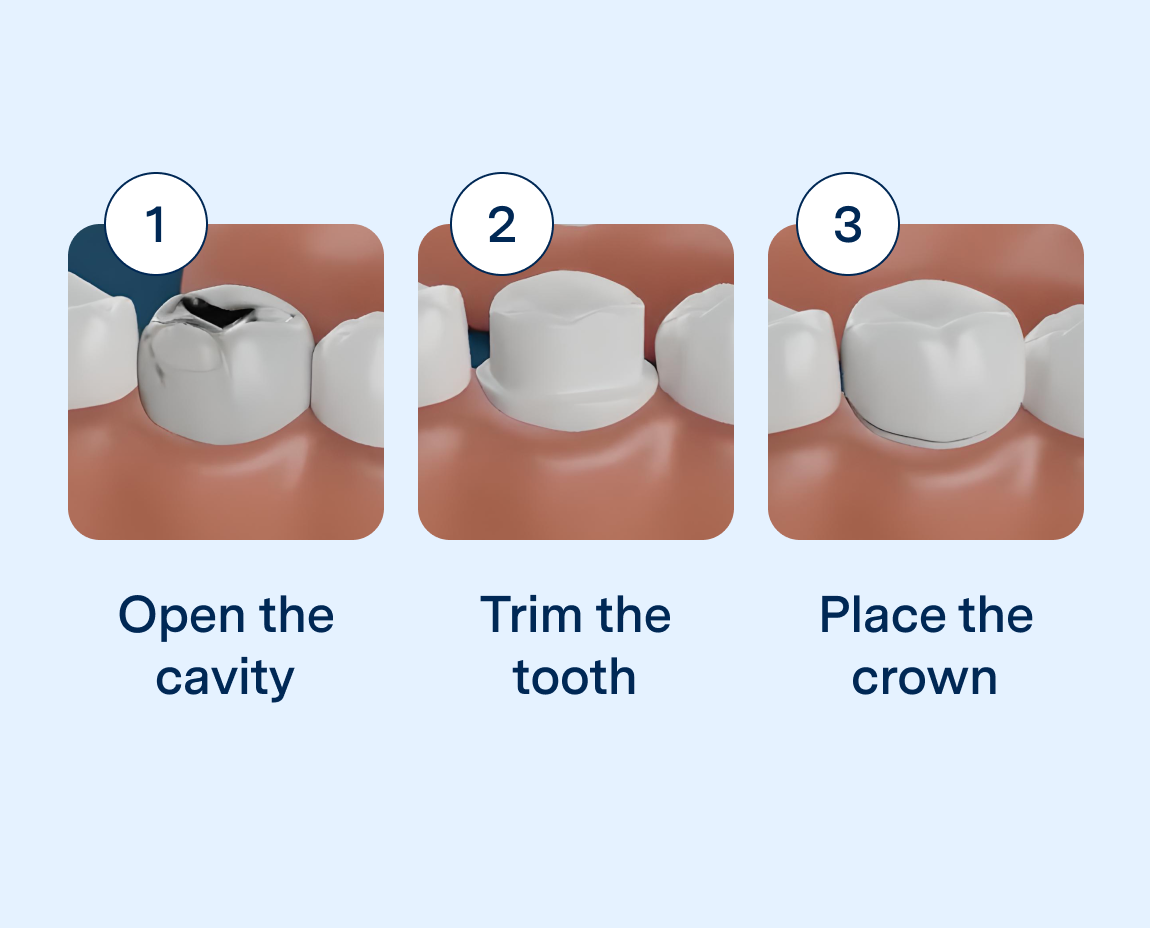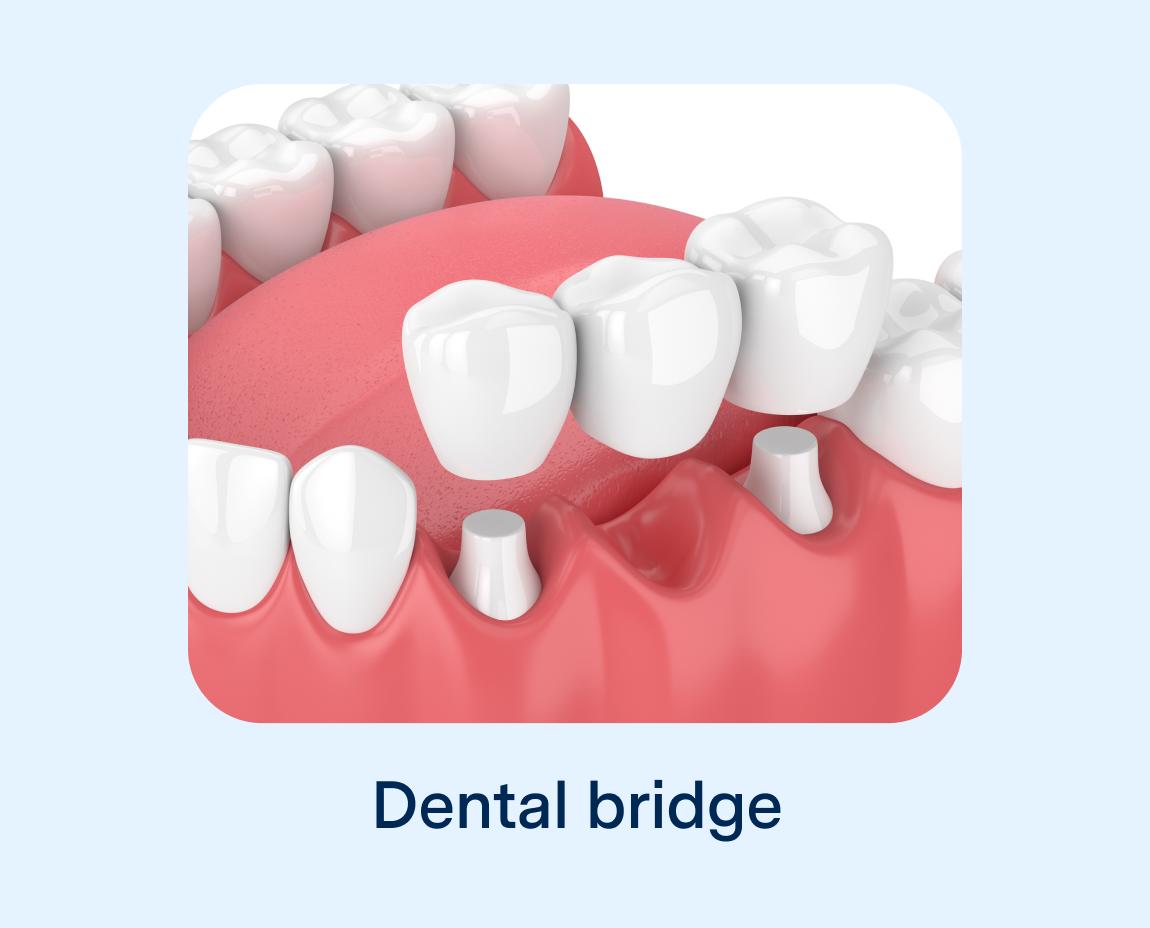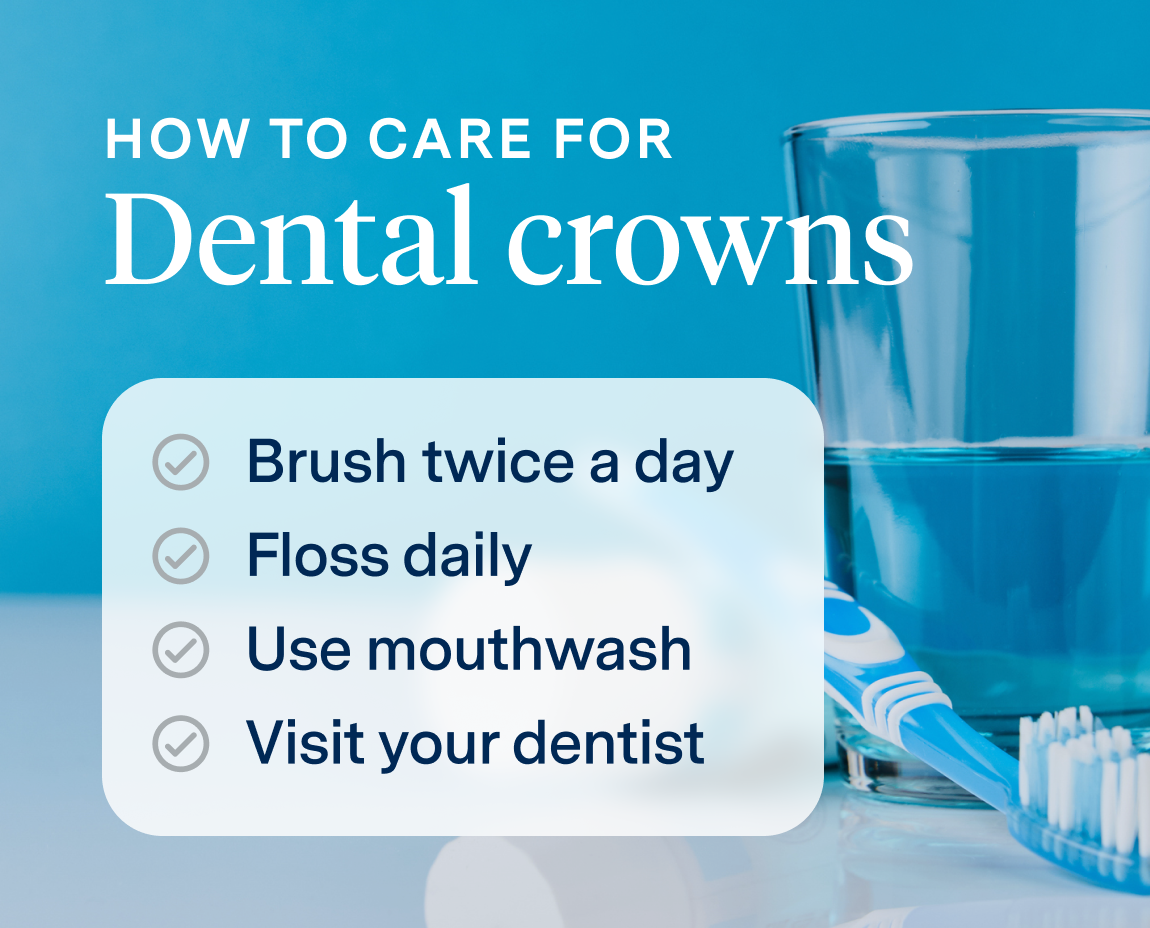Dental crown procedure explained: what you need to know
Explore the dental crown procedure. Learn about types, benefits, materials, and how to care for them.
Getting a dental crown procedure? Want to know more about what to expect? This guide will tell you all you need to know
If you’ve experienced damage to your teeth or have been dealing with a tooth weakened by tooth decay, your dentist has probably spoken to you about dental crowns. Crowns are a tooth replacement option that can help you get the functionality back of your tooth or teeth.
But what exactly are dental crowns, and what can you expect from the dental crown procedure? In this guide, we’re going to go over:
What dental crowns are and some of the benefits
The types of dental crowns available
What to expect from the dental crown procedure
How to care for dental crowns
Who is a good candidate for dental crowns

What is a dental crown?
Learn what a dental crown is and what it’s used for
Dental crowns are an easy way to restore the functionality of your teeth. They are made from a variety of materials and the procedure is minimally invasive.
Dental crowns are typically placed on top of a tooth or multiple teeth that are damaged and need extra protection. They are also used to restore the shape of your tooth if it has been broken or needed to be reshaped by your dentist due to tooth decay. It may be helpful to think of dental crowns as caps or helmets that are used to safely protect your tooth and restore its ability to bite and chew easily.
Dental crowns can also give you back confidence in your smile. Dental crowns can allow you to smile and speak with others with ease and confidence again.
A dental crown is designed to bring back the strength and appearance of your natural tooth, and they are a popular tooth replacement option. You can get a dental crown on any tooth, regardless of whether it’s at the front of your mouth or in towards the back.
Your dentist might recommend you for a dental crown procedure if you:
Have a broken or chipped tooth
Have a decayed tooth that is weakened
Need to hold a dental bridge in place
Have recently had a root canal
Are dealing with a discolored tooth
These are all viable reasons you might want to get a dental crown. But why would you choose this tooth replacement option over another?
What are the benefits of a dental crown?
Why might you consider getting a dental crown?
Many people consider dental crowns the go-to option for restoring the strength and appearance of their teeth.
Now that you know a little more about what a dental crown is, let’s learn a little more about the benefits of getting a dental crown. You’ll notice the difference before and after getting a dental crown, however you’ll want to discuss this option in detail with your dentist.
Can help relieve discomfort
Dental crowns are useful for many reasons, one of them being to protect your tooth after treatment. If you’ve recently had a cavity filled or had a root canal procedure, your smile may be vulnerable to additional damage or tooth decay.
In addition to fortifying your teeth, a dental crown can also help alleviate any tooth sensitivity that might have developed due to a tooth filling or root canal.
Protect a damaged or decaying tooth
One of the most common reasons for getting dental crowns is to cap a damaged or decaying tooth, protecting it and strengthening it in the process. Whether you have a chipped tooth, or have had much of your tooth removed due to decay, a dental cap is a great way to seal it going forward.

Restore your smile
Although many people use dental crowns to protect their damaged teeth, they can also be used if you have gaps between your teeth, or if they are misshapen or discolored. Speak to your dentist about what your cosmetic goals are, and they may decide that dental crowns can help you achieve them.
Having your confident smile back with the help of crowns is a good investment to uplift your oral health and overall health and can make a difference in your quality of life.
Dental crowns are custom made to last
One of the major benefits of dental crowns is that they are considered a mostly permanent tooth restoration method and are custom-made for your unique tooth. Crowns are a very stable and long-lasting option, whether you need to fix a damaged tooth, or want to realign your smile.
Are there disadvantages to dental crowns?
As we’ve seen, depending on your situation, there are many advantages to getting a dental crown. However:
Your natural teeth will need to be permanently reshaped for the crown to properly fit
Your teeth with crowns could become more sensitive to hot or cold foods/beverages
Your crown can still become chipped or cracked
Crowns do not protect your teeth from gingivitis or gum disease
You still need to maintain your teeth with regular brushing, flossing and dental check-ups after crowns have been placed
Types of dental crowns
Dental crowns can come in a variety of materials
The type of dental crown material you get will depend on where you need your crown.
Dental crowns are a very versatile option when it comes to a long-lasting tooth replacement option. Depending on your situation, you can choose from a variety of materials designed to help protect and strengthen your natural tooth.
Metal.
Metal crowns typically include alloys with high levels of gold, platinum, palladium, nickel, or chromium. These materials are all very strong, and they are resistant to chipping or cracking. You can also expect these types of materials to slowly wear down over the years.
Porcelain fused with metal.
One way to get the strength and durability of metal without the different color is to go with a metal crown fused with porcelain. This type of material gives you the option of having the crown match the rest of your teeth. Depending on which tooth your crown covers, this could be visible in your smile.
Resin.
Another option for a crown that can match the rest of your teeth is to choose resin as a material. However, like porcelain or ceramic crowns, resin is also prone to chipping and even fractures.
Ceramic or porcelain.
If you have a tooth that needs a crown that is at the front of your mouth and very visible, your dentist might recommend going with a ceramic or porcelain option. Although the color is easiest to match with a ceramic or porcelain crown, they can still be chipped and may cause extra wear on the teeth opposite of them.
Pressed ceramic.
This option is designed with a very strong inner core and a ceramic outer layer that is easy to match with the rest of your teeth. This type of dental crown is more resistant to chipping than others.
What to expect from the dental crown procedure
Learn all about the dental crown procedure and what you can expect from it

If you’re going to get a crown placed on your teeth, that’s great news because you’re on your way to restoring the appearance and functionality of your teeth. The dental crown procedure, as we mentioned earlier, is a straightforward procedure. Afterwards, you can expect to walk away with your tooth (or teeth) restored, giving you back your confident smile.
There are two ways in which you might receive a dental crown, in one visit or spread out over two visits.
Getting a dental crown in two visits
When you are undergoing tooth restoration, your dentist might conclude that a crown is the best option for you and could propose a traditional two-visit procedure or a same-day procedure. Your dentist will examine and clean your tooth, perform dental X-rays to determine if additional work, such as a root canal, is required before placing the cap due to significant decay or damage.
Your dentist then prepares your tooth for the cap by filing it down, the amount of which depends on the material of the crown and the severity of your previous damage. If necessary, your dentist will add more filling material. To ensure your bite will not be affected by the new crown, an impression or digital image of your tooth and its surrounding area is taken.
While you wait for your permanent crown, you receive a temporary one and are advised to avoid hard or sticky foods. Once your permanent crown is ready, it is attached after confirming it fits well and is the color you expected.
Same day dental crown
The first step in acquiring your dental crown is to consult with your dentist. After understanding your unique situation, they can ascertain whether a crown is indeed the optimal solution for you. If they affirm this, they will evaluate multiple factors before deciding on the type of material suitable for your crown.
Your dentist will then proceed to remove any damaged tissue and take 3D impressions.
These 3D models assist them in constructing your crown directly in their office, typically carved from ceramic using a machine. Once your crown is ready, which could take anywhere from an hour to two hours, it can be cemented onto your tooth on the very same day.

Dental crown and bridge procedure
We’ve discussed how your dentist will place a dental crown on one tooth, but what if you need a dental bridge? This type of tooth restoration procedure is also very straightforward; however, an artificial tooth (or teeth) will be held in place between two crowns, creating the bridge structure.
If you have a missing tooth or teeth in between two damaged or decaying teeth, your dentist might opt for this type of procedure as opposed to a partial denture. To start, they’ll need to take measurements, molds, and images of your teeth that require the dental crown bridge. Like the regular dental crowns, this can involve taking X-rays, impressions, or digital images of your affected teeth, as well as your surrounding and opposite teeth. This is done to ensure that your bite will still be the same as your dental crown bridge.
Once the bridge is ready to be placed, your dentist will first prepare the teeth that will receive the crowns. Then, they will cement the crowns to your teeth that hold the bridge in place, with the artificial teeth in between. This is a great option for you if you want something that feels more natural than a partial denture.

How do you care for dental crowns?
Is there any special way to care for dental crowns?
Now that you’ve got your crowns in place, how should you go about caring for them? Your dentist will give you specifics, but you can expect to care for your dental crowns just as you would your natural teeth. This means:
Using mouthwash
Who is a good candidate for dental crowns?
When should you get dental crowns?
Dental crowns are a good idea for anyone who wants to protect their teeth from additional damage or decay. If you have a damaged tooth or are worried about benefiting from a crown, schedule an appointment to speak with your dentist. Crowns are a minimally invasive way to strengthen your teeth and restore your confident smile.
Your welcome starts here
Your new patient visit to Aspen Dental is our most important appointment together.

